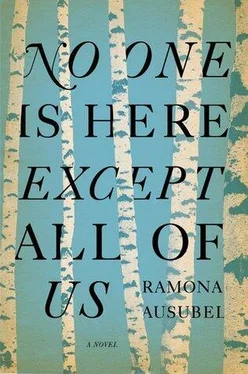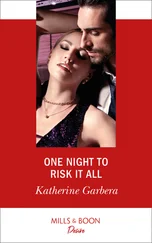At the door, a knock. I opened it, shrieked when Regina was on the other side. Regina with her suitcase. Regina with her nicest dress and her white lace collar, soggy now with rainwater. Maybe we would be whole again. Behind her were Aunt Kayla and Uncle Hersh. My mother, still in her nightgown, straightened her spine. Her head picked up the light from all directions.
“My daughter,” she said, taking Regina’s hand and kneading it like bread.
“She is not what we had in mind,” Uncle Hersh said quickly, looking to his wife for approval, his voice shaky and uncertain.
“Your daughter?” my mother asked.
“ Your daughter,” Kayla corrected. “She’s too big. Her feet, her hands. Too big. We hadn’t remembered how big she was. It is not a good match for us,” she said sternly. “We want to be a different kind of parents.” Kayla stepped forward and took my hand. “Young Lena,” she said. “My Lena. Smallest of all, Lena.” Kayla examined my fingers, their puffy knuckles, their delicate reach. She put my palm up against her own. She smiled at her husband. “Look at what a difference there is. She is so much smaller.”
I felt like an open window through which anything might blow. Regina looked at the hands attached to her wrists as if for the first time. These hands were big enough to make her unlovable, but big enough to save her, too.
My mother closed her eyes and took the suitcase from the floor. She handed it to me. “You have everything you need,” she told me. “You are my reason to live. You are everyone’s reason to live. Look how many people you can save.” My heart went on and on inside the empty cavern of my body. There is no way this is actually happening. This cannot be , my brain yowled.
Hersh looked at my mother with his red, unslept eyes. “You have no idea,” he said, but she stopped him.
“Just go,” she said. “Take my daughter. Your daughter. Our daughter.”
I thought for the first time in my life about my body — what was inside, what was outside, what was strong and what was weak. I did not know whether my good knees were thanks to my father. I did not know that I had my mother’s strong stomach and dry skin. My thick ankles were Vlad’s, and my sinewy calves Perl’s. My long, thin back came from my maternal grandmother, who died young and in love and unexpectedly from a disease no one could name. My collarbone, like my great-great-great-grandfather’s, was weapon sharp. A line of great-aunts and great-uncles had passed along the blond fuzz now dusting my face like early snow, and the radiating red cheeks beneath were thanks to a fiery streak always present on my father’s side, in the women especially. I was not old enough to tell whether I would carry myself heavy and low like my mother or high and light like my father.
Grandma Elka, Grandpa Sig, Aunt Rose, Aunt Esther and my mother’s twin uncles Noah and Noah (who were told apart by their beards if not their names) were enshrined in my body. They did not spare their pointy elbows, deep belly buttons, pink skin, doughy earlobes, hard noses, flat feet, long second toes or propensity to go wandering until the sun slipped out of view; they gave me everything they had. All the ghosts gathered around me. “You have us,” I heard them say. “You are us. We are your blood, your muscles, your bones.”
In the doorway, Perl looked into my eyes, eyes a color never before seen in our family — a crisp weedy green my body had invented just for me. “You will always be you,” my mother said.
Any legacy I pass down is mostly imagined, because on that day in the gurgling newness of the world, I began again for the second time that week. Would I grow like a seedpod sprung open a mile from my home? Or did everything owe itself to what had been, even if it hadn’t?
The anger I felt dammed itself up when I looked at Regina. I had been complicit when she was the one given away. I had not hidden her in the forest or built a basket of reeds in which she might float away. I had loved her and wished her well, but I had let her go all the same. Now that it was my turn, I knew there was no one in the world to drag me back home. There was no little sister to trade me in for. I had invented a world — now all that was left was surviving it.
I refused to walk, and Hersh picked me up in his arms and carried me through the rain, which washed me down so that when we arrived at the door and Hersh stamped the mud from his polished black boots I was a new girl in a new life, dripping my old self onto the rug.
In the syrup of late night, on the sixth day of the world, the butcher, banker and the barber’s wife made their way out to the stranger’s post with lanterns to ask for things they had forgotten to ask for in daylight. It would be nice to stop the dead old world from trying to sneak into this one. Good to look ahead to winter and hope for enough snow to wet the fields but not enough to chill our bones. When they got there, our stranger was gone. Her striped blanket was sagging and wet, the four sticks supporting it leaning into each other. Her chair was still footed to the cobblestones, but now the only thing in it was a pool of rainwater, milky with moonlight.
They finally found her lying on her side on the jeweler’s floor, the jeweler watching her from the other side of the room while she drew a picture of two children with the charcoal of a burned log. The faces looked back at her, bloodless and wrong, and she tried to make them righter by fuzzing the lines, and in this way they slowly disappeared into black dust blown across the floor by our stranger’s breath.
The small group of seekers knocked on the door. They said, “Where were you? We need you.” They shook their umbrellas out onto the jeweler’s floor.
“I was here,” she told them. “I am here.”
Their prayers had turned to complaints. They began to list the strange ailments they had developed, revealing that, in spite of a new world, all the old anxiety had stayed alive and well. “I have terrible leg cramps. Could a demon be living in there?” the barber’s wife asked.
“Every night I get a fever for exactly one hour,” the banker said.
“Everything looks blue to me. Everything looks like dusk,” said the butcher.
“I can’t remember my own name sometimes. I can’t remember who I am,” the barber’s wife added.
The stranger listened. She had no way to heal these people. She suggested, as kindly as possible, that maybe in the morning they could consult the healer.
“But we still have to pray. I’m serious about not being able to find you. I think you need to stay put,” the banker said.
“If you don’t mind,” others added.
“We’ll bring blankets for you. We’ll pray for many warm blankets for you. In fact, we promise that every prayer we say for ourselves will also be a prayer for you.”
The jeweler wanted to tape their mouths shut. He wanted to roll them down a mountainside. He wanted to light them on fire. Before he could even perform the meager task of opening his mouth to object, the stranger was being led outside, preparing to give herself completely over.
In my new room there was a reddish wood dresser and a bed made up tight with a pink-and-green-flowered blanket. There was a silver music box on the dresser and a wicker basket for dirty clothes. There were six wooden hangers on a rod, waiting to display the shells of dresses and coats. My aunt and uncle sat on the bed next to me, the girl who used to be the youngest daughter of the cabbage picker but was now the only daughter of the saddlemaker.
“So,” Kayla said, “you live here now. This is your bed, and that is your dresser. You can put your things in it. And on it. That is your music box. It plays music.” I opened it and it plinked a song I had never heard before. This day was many things, but real was not one of them.
Читать дальше












